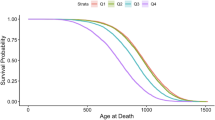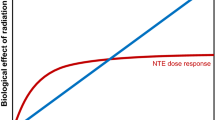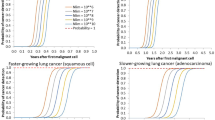Abstract
WILD species of rodents are reported to be more resistant to acute radiation exposure than laboratory strains1. The LD50(30) acute exposure dose for the old-field mouse (Peromyscus polionotus), the cotton mouse (Peromyscus gossypinus) and the harvest mouse (Reithrodontomys humilis) is 1,100 to 1,200 r., for the cotton rat (Sigmodon hispidus) 1,200 to 1,500 r. and for pocket mice (Perognathus formosus and P. longimembris) 1,300 to 1,500 r.2–4. LD50(30) values for laboratory rodents range from 450 to 850 r. when the radiation is delivered as a single acute dose5. Ecologists have tended to interpret this as an advantage conferred by the “wild” condition. Chronic exposure over a long time is, however, less damaging than the same dose given in a short time5, but new results show that wild mice are quite sensitive to damage from chronic exposure in terms of life shortening and reduced fertility.
This is a preview of subscription content, access via your institution
Access options
Subscribe to this journal
Receive 51 print issues and online access
$199.00 per year
only $3.90 per issue
Buy this article
- Purchase on Springer Link
- Instant access to full article PDF
Prices may be subject to local taxes which are calculated during checkout
Similar content being viewed by others
References
Chang, M. C., Hunt, D. M., and Turbyfill, C., Nature, 203, 536 (1964).
Provost, E. E., and Kellogg, F. E., in Appendix to Annual Report to the AEC, Contract AT(38–1)–310, Task III (1964).
Gambino, J. J., and Lindberg, R. G., Radiat. Res., 22, 586 (1964).
Golley, F. B., Gentry, J. B., Menhinick, E. F., and Carmon, J. L., Radiat. Res., 24, 350 (1965).
Bond, V. P., Fliedner, T. M., and Archambeau, J. O., Mammalian Radiation Lethality (Academic Press, New York, 1965).
French, N. R., Maza, B. G., and Aschwanden, A. P., Science, 154, 1194 (1966).
Andrewartha, H. G., and Birch, L. C., The Distribution and Abundance of Animals (University of Chicago Press, Chicago, 1954).
French, N. R., Health Physics, 11, 1557 (1965).
Sacher, G. A., and Grahn, D., J. Nat. Cancer Inst., 32, 277 (1964).
Sugahara, T., Genetics, 50, 1143 (1964).
Searle, A. G., Genetics, 50, 1159 (1964).
Sacher, G. A., and Trucco, E., in Biological Aspects of Aging (edit. by Shock, N. W.), 244 (Columbia University Press, New York, 1962).
Gambino, J. J., Lindberg, R. G., Hayden, P., and Tagami, T. Y., in Investigations of Perognathus as an Experimental Organism in Space Biology (edit. by Lindberg, R. G.), 240 (Northrop Corporate Laboratories, Hawthorne, California, 1968).
Cosgrove, G. E., Upton, A. C., Congdon, C. C., Dogherty, D. G., Christenberry, K. W., and Gosslee, D. G., Radiat. Res., 21, 550 (1964).
Dunmier, W. W., Ecology, 41, 174 (1960).
Marshall, J. S., Ecology, 47, 561 (1966).
Author information
Authors and Affiliations
Rights and permissions
About this article
Cite this article
FRENCH, N. Radiation Sensitivity of Rodent Species. Nature 222, 1003–1004 (1969). https://doi.org/10.1038/2221003a0
Received:
Revised:
Issue Date:
DOI: https://doi.org/10.1038/2221003a0
Comments
By submitting a comment you agree to abide by our Terms and Community Guidelines. If you find something abusive or that does not comply with our terms or guidelines please flag it as inappropriate.



